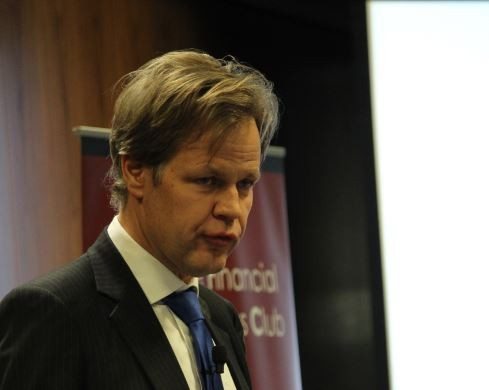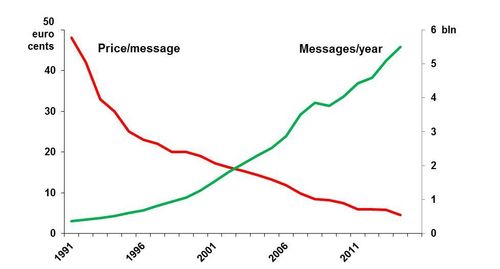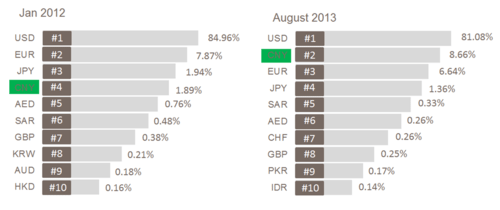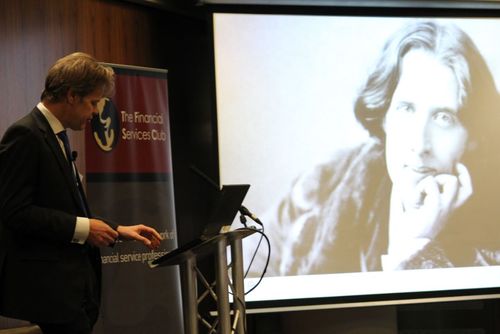
Still busy in the Financial Services Club world with meetings in Stockholm, Vienna, Warsaw and London all in the past two weeks.
The interesting theme of all these meetings, and those in our future plans, is the digitisation of banking.
Most notably, the Chi-x BAT effect noted in our Stockholm launch meeting of the Nordic Financial Services Club, and the presentation from Gottfried Leibbrandt, Chief Executive of SWIFT, at our London dinner last week.
Gottfried kindly indulged us with a view of where SWIFT’s vision now lies.

In a stimulating but short presentation, he began by discussing the key elements of change in the SWIFT model, one of which is the ability to pretty much process anything for virtually nothing.
This is a theme I explored four years ago when talking about Banking-as-a-Service, or on-demand banking, and it’s a theme that crops up again now.
The fact is that a bank can process a $1 billion transaction today for about the same cost as a $1 transaction. That was not the case two decades ago.
Bearing this fact in mind, and that this is a result of the digitisation of banking, it does beg the question as to why we see such high fees taken on transactions.
For example, I recently had a $5,000 transaction between UK and Malaysia where $40 disappeared in wire fees. Why? Because they can.
Banks take fees because they can.
Similar to the way US banks increased checking account fees to recoup losses on debit card interchange after the Durbin Amendment to the Dodd-Frank Act (although some small banks did the opposite), many banks eke out their shareholder interest by nibbling away at customer’s money with a few cents here and a few cents there in transaction fees.
Nevertheless, I digress as this was not Gottfried’s point. It’s just my point when I see a chart like this:
SWIFT volume and price of messaging trends since 1990

And realise that banking has been massively automated, digitised and restructured by technology over the past two decades but their profiteering from such automation has not returned the benefits to the customer.
Back to message, SWIFT has been delivering some innovation over the past year including corporate focused services such as the 3SKey, sanctions screening, Market Infrastructure Resilience Services with the Bank of England (MIRS BoE) and more. And more is planned in the pipeline, including a Know Your Client Utility for bank to corporate relationships; the Go Local India joint venture with the Reserve Bank of India to provide a SWIFT-based RTGS service in India; and, similarly, working with CIPS in China to support international Renminbi clearance and settlement.
On the latter note, Gottfried noted that London is now processing 62% of SWIFT’s international RMB transactions, up from 54% in 2010, so George Osborne’s ambitions to make London a global RMB processing hub appear to be on target.
This is a critical factor as the world sees Africa and Asia becoming dominant in the next decades. We have already seen a distinct shift from West to East in trade, and soon we will see the East become even more dominant as trade shifts from the East to Africa.
Gottfried underscored this point with a slide from SWIFT Watch that shows RMB is now the second largest traded currency through the SWIFT network, overtaking the Euro and bearing down on the Dollar.

Although he did point out that this was for trade finance, and not as a currency in general usage for commerce in everyday life.
There were plenty of other great insights during the speech, but I’m not going to share anymore here, as you should join the Club if you’re that interested!
What I will say is that there was a sense of hurrah! when Gottfried said that SIBOS 2016 will be in Geneva.
Yes, after a long absence, SIBOS returns to Europe three years from now (2014 is Boston and 2015 Singapore), but the hurrah! was not for this reason but because it confirmed that SIBOS will at least not be in Sheffield.
Note, there is nothing wrong with Sheffield btw. As Oscar Wilde said:
It is absurd to divide people into good and bad.
People are either charming or tedious.

Chris M Skinner
Chris Skinner is best known as an independent commentator on the financial markets through his blog, TheFinanser.com, as author of the bestselling book Digital Bank, and Chair of the European networking forum the Financial Services Club. He has been voted one of the most influential people in banking by The Financial Brand (as well as one of the best blogs), a FinTech Titan (Next Bank), one of the Fintech Leaders you need to follow (City AM, Deluxe and Jax Finance), as well as one of the Top 40 most influential people in financial technology by the Wall Street Journal's Financial News. To learn more click here...

